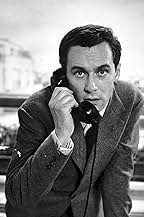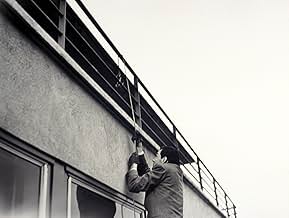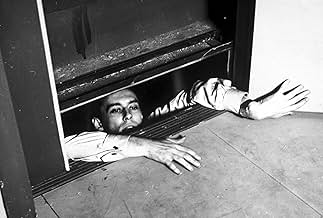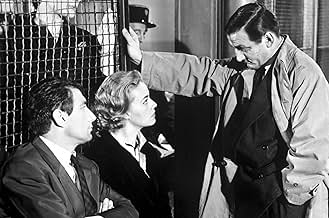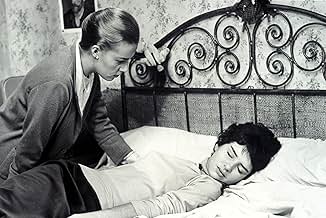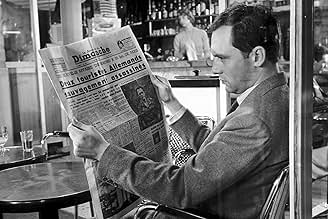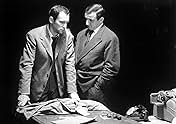VALUTAZIONE IMDb
7,9/10
30.330
LA TUA VALUTAZIONE
Un uomo d'affari sicuro di sé uccide il suo datore di lavoro, il marito della sua amante, provocando senza volerlo una sfortunata catena di eventi.Un uomo d'affari sicuro di sé uccide il suo datore di lavoro, il marito della sua amante, provocando senza volerlo una sfortunata catena di eventi.Un uomo d'affari sicuro di sé uccide il suo datore di lavoro, il marito della sua amante, provocando senza volerlo una sfortunata catena di eventi.
- Regia
- Sceneggiatura
- Star
- Premi
- 1 vittoria in totale
Recensioni in evidenza
No need to recap the plot. The movie really represents a triumph of form over content. Seldom have I seen a smoother technique than director Malle shows here. The transition from scene to scene is almost seamless and keeps the viewer engaged regardless what's developing plot-wise. Then too, Decae's camera work shows how compelling natural lighting can be. The overall effect is one of effortless fluidity, a style well suited to lyrical subjects.
The trouble is the material itself is better suited to Hollywood B-movie techniques. In short, the material is jagged, while Malle's style is smooth, resulting unfortunately in a thriller drained of inherent drama. Note, for example, the elevator sequence, a predicament fairly bursting with suspenseful potential. Yet Malle's style does little to heighten the implicit desperation and even cuts away (though smoothly) from the mounting tension. To be fair, Ronet (Tavernier) adds nothing by remaining impassive throughout. (Perhaps paratroopers never sweat.) Thus the movie's dramatic centerpiece flattens out into just one more event among many.
Then there are the various misadventures of the free-spirited kids. They look cuddly, but remain amoral cyphers throughout, their double homicide coming across again as just one more event, no more important than Florence's (Moreau) dispirited walk up the avenue. In fact, the one time Malle highlights with his camera is that lengthy trudge through Paris, a director clearly fascinated by Moreau's distinctive appearance. Again, the style is smooth and polished, but also highly impersonal and homogenizing. I kept wishing one of Hollywood's noir masters like Nicholas Ray or Billy Wilder had gotten hold of the material first.
No need to go on apart from Malle about a sloppy script with its number of plot holes helpfully cited by other reviewers, or about overlooked details like a bullet to the head that raises no blood. All in all, I wonder how many folks would celebrate the film if it were not from France with Malle's name on it. Apart from its influence on French cinema, the movie does not wear well over time. Moreover, given the style he shows here, it's no surprise to me that Malle's breakthrough movie would be titled The Lovers rather than this over-civilized slice of thick ear.
The trouble is the material itself is better suited to Hollywood B-movie techniques. In short, the material is jagged, while Malle's style is smooth, resulting unfortunately in a thriller drained of inherent drama. Note, for example, the elevator sequence, a predicament fairly bursting with suspenseful potential. Yet Malle's style does little to heighten the implicit desperation and even cuts away (though smoothly) from the mounting tension. To be fair, Ronet (Tavernier) adds nothing by remaining impassive throughout. (Perhaps paratroopers never sweat.) Thus the movie's dramatic centerpiece flattens out into just one more event among many.
Then there are the various misadventures of the free-spirited kids. They look cuddly, but remain amoral cyphers throughout, their double homicide coming across again as just one more event, no more important than Florence's (Moreau) dispirited walk up the avenue. In fact, the one time Malle highlights with his camera is that lengthy trudge through Paris, a director clearly fascinated by Moreau's distinctive appearance. Again, the style is smooth and polished, but also highly impersonal and homogenizing. I kept wishing one of Hollywood's noir masters like Nicholas Ray or Billy Wilder had gotten hold of the material first.
No need to go on apart from Malle about a sloppy script with its number of plot holes helpfully cited by other reviewers, or about overlooked details like a bullet to the head that raises no blood. All in all, I wonder how many folks would celebrate the film if it were not from France with Malle's name on it. Apart from its influence on French cinema, the movie does not wear well over time. Moreover, given the style he shows here, it's no surprise to me that Malle's breakthrough movie would be titled The Lovers rather than this over-civilized slice of thick ear.
10jbinfo
This film is a master piece. Miles Davis's music is superb. It is an object lesson on the art of combining sound and vision. The tension and the brooding Parisian atmosphere are heightened with cool and poignant playing. It is surprising (to the best of my knowledge) that this is the only complete original film score he produced.
The story of the crime is clever. It has reasonable human motivation and plot, and is steadily revealed. But, it is the study of 'being in the wrong place at the wrong time' that makes this film a classic. The series of chance events that will dramatically effect the characters' lives, give this film a similar feel to 'Run Lola Run' or 'Irreversible', dispute this film's linear structure and age. The dark cinematography is excellent.
I have only had an opportunity to see it once (I only just caught it because BBC4 listed it under its English title), but I would like to see it again.
The soundtrack is widely available, but I can not find the film on DVD or PAL VHS. This film should be available to a wider audience, for me, preferably in French with English subtitles.
P.S. This wonderful film is now available on DVD as part of the Louis Malle Collection: Volume 1. (Updated 11/10/2006.)
The story of the crime is clever. It has reasonable human motivation and plot, and is steadily revealed. But, it is the study of 'being in the wrong place at the wrong time' that makes this film a classic. The series of chance events that will dramatically effect the characters' lives, give this film a similar feel to 'Run Lola Run' or 'Irreversible', dispute this film's linear structure and age. The dark cinematography is excellent.
I have only had an opportunity to see it once (I only just caught it because BBC4 listed it under its English title), but I would like to see it again.
The soundtrack is widely available, but I can not find the film on DVD or PAL VHS. This film should be available to a wider audience, for me, preferably in French with English subtitles.
P.S. This wonderful film is now available on DVD as part of the Louis Malle Collection: Volume 1. (Updated 11/10/2006.)
10noralee
"Elevator to the Gallows (Ascenseur pour l'échafaud)" is a master work, so it's startling to learn that it was Louis Malle's first feature. It's a mother lode textbook of how-to for noir genre filmmakers as he creates his own style from what he's learned from other masters.
Malle pays tribute to the tense murder style of Hitchcock with Billy Wilder's cynicism of selfishness a la "Double Indemnity" plus Graham Greene-like, post-war politics from "The Third Man"-- and arms and oil dealers with military pasts in the Middle East are not outdated let alone adulterous lovers and rebellious teenagers.
The film drips with sex and violence without actually showing either -- sensuous Jeanne Moreau walking through a long, rainy Paris night is enough to incite both.
The black and white cinematography by Henri Decaë is breathtakingly beautiful in this newly struck 35 mm print, from smokey cafés with ever watchful eyes like ours to the titular, ironic alibi's long shafts (which surely must have inspired a key, far paler scene in "Speed") to highway lights, to a spare interrogation box, but particularly in the street scenes. The coincidences and clues are built up, step by step, visually, including the final damning evidence.
Miles Davis's improvisations gloriously and agitatedly burst forth as if pouring from the cafés and radios, but the bulk of the film is startlingly silent, except for ambient sounds like rain that adds to the tension in the plot.
The characters are archetypes -- the steely ex-Legonnaire, the James Dean and Natalie Wood imitators, the preening prosecutor -- that fit together in a marvelous puzzle. But all are cool besides Moreau's fire, as she dominates the look of the film, just wandering around Paris.
There is some dialog that doesn't quite make sense at the end, but, heck, neither does "The Big Sleep" and this is at least in that league, if not higher in the pantheon.
Malle pays tribute to the tense murder style of Hitchcock with Billy Wilder's cynicism of selfishness a la "Double Indemnity" plus Graham Greene-like, post-war politics from "The Third Man"-- and arms and oil dealers with military pasts in the Middle East are not outdated let alone adulterous lovers and rebellious teenagers.
The film drips with sex and violence without actually showing either -- sensuous Jeanne Moreau walking through a long, rainy Paris night is enough to incite both.
The black and white cinematography by Henri Decaë is breathtakingly beautiful in this newly struck 35 mm print, from smokey cafés with ever watchful eyes like ours to the titular, ironic alibi's long shafts (which surely must have inspired a key, far paler scene in "Speed") to highway lights, to a spare interrogation box, but particularly in the street scenes. The coincidences and clues are built up, step by step, visually, including the final damning evidence.
Miles Davis's improvisations gloriously and agitatedly burst forth as if pouring from the cafés and radios, but the bulk of the film is startlingly silent, except for ambient sounds like rain that adds to the tension in the plot.
The characters are archetypes -- the steely ex-Legonnaire, the James Dean and Natalie Wood imitators, the preening prosecutor -- that fit together in a marvelous puzzle. But all are cool besides Moreau's fire, as she dominates the look of the film, just wandering around Paris.
There is some dialog that doesn't quite make sense at the end, but, heck, neither does "The Big Sleep" and this is at least in that league, if not higher in the pantheon.
The best laid plans seldom consider the unexpected, with the most subtle of causes, the opportunities taken, resulting in profoundly unfortunate effects. An elegantly structured piece of story telling with sound, pictures and performances raised to the rafters, this is a piece of cinema you will struggle to shear away from and, with luck, it wont leave you hanging.
A self-assured business man murders his employer, the husband of his mistress, which unintentionally provokes an ill-fated chain of events.
Journalist Barry Farrell wrote, "Moreau had 20 forgettable films behind her... Malle put Moreau under an honest light and wisely let his camera linger. The film was nothing special, but it did accomplish one thing: it proposed a new ideal of cinematic realism, a new way to look at a woman. All the drama in the story was in Moreau's face – the face that had been hidden behind cosmetics and flattering lights in all her earlier films." Farrell is certainly right about the portrayal of Moreau. How can you make a leading lady anything but glamorous? Malle found a way that was quite successful.
As for the film being "nothing special", I think Farrell is wrong. A 1950s French film noir that is well executed? This is something we need more of. Starting with a murder and then spreading out from there, this is a good story of suspense, intrigue and all that. The whole concept of being caught in an elevator is incredible, and probably unprecedented.
Journalist Barry Farrell wrote, "Moreau had 20 forgettable films behind her... Malle put Moreau under an honest light and wisely let his camera linger. The film was nothing special, but it did accomplish one thing: it proposed a new ideal of cinematic realism, a new way to look at a woman. All the drama in the story was in Moreau's face – the face that had been hidden behind cosmetics and flattering lights in all her earlier films." Farrell is certainly right about the portrayal of Moreau. How can you make a leading lady anything but glamorous? Malle found a way that was quite successful.
As for the film being "nothing special", I think Farrell is wrong. A 1950s French film noir that is well executed? This is something we need more of. Starting with a murder and then spreading out from there, this is a good story of suspense, intrigue and all that. The whole concept of being caught in an elevator is incredible, and probably unprecedented.
Lo sapevi?
- QuizMiles Davis recorded the music in a single recording session while he watched a screening. He composed it while watching a rough cut and then invited a quartet of French and US musicians in a for few hours (from 11pm to 5am one night), improvising each number and allegedly sipping champagne with Jeanne Moreau and Louis Malle.
- BlooperWhen Florence arrives at the motel, the photos are just being developed - with the lights on! Exposing the prints to light before fixation would make them turn black. By the way, it's not recommended to put your hands into developer.
- Citazioni
Julien Tavernier: Don't sneer at war. It's your bread and butter. Indochina netted you how much? And now Algeria. Have some respect for war. It's your family heirloom.
- Colonne sonoreAscenseur Pour L'Échafaud (Générique)
Composed by Miles Davis
Performed by Miles Davis (Trumpet), Barney Wilen (Tenor Saxophone), Emilhenco (as René Urtreger) (Piano), Pierre Michelot (Bass) and Kenny Clarke (Drums)
I più visti
Accedi per valutare e creare un elenco di titoli salvati per ottenere consigli personalizzati
- How long is Elevator to the Gallows?Powered by Alexa
Dettagli
- Data di uscita
- Paese di origine
- Siti ufficiali
- Lingue
- Celebre anche come
- Elevator to the Gallows
- Luoghi delle riprese
- 26 Rue de Courcelles, Paris 8, Parigi, Francia(Tavernier climbing on the upper terrace)
- Azienda produttrice
- Vedi altri crediti dell’azienda su IMDbPro
Botteghino
- Lordo Stati Uniti e Canada
- 374.671 USD
- Fine settimana di apertura Stati Uniti e Canada
- 7354 USD
- 26 giu 2005
- Lordo in tutto il mondo
- 431.784 USD
- Tempo di esecuzione1 ora 31 minuti
- Colore
- Proporzioni
- 1.66 : 1
Contribuisci a questa pagina
Suggerisci una modifica o aggiungi i contenuti mancanti

Divario superiore
By what name was Ascensore per il patibolo (1958) officially released in India in English?
Rispondi

